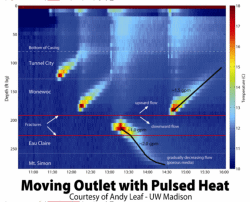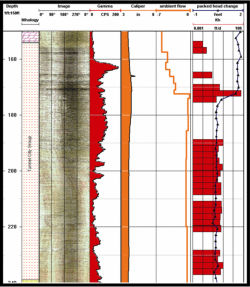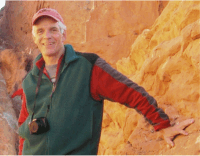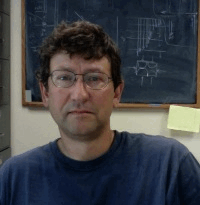On-Demand Webinars
BOREHOLE FLOW METER TECHNIQUES:
For Assessing Bedrock Stratigraphy and Fracture Hydraulics
 Measuring the vertical movement of water in wells and boreholes can be a key to understanding the subsurface hydraulic environment. Borehole flowmeters can measure both the direction and velocity of vertical flow along well bores, and these flows relate directly to aquifer parameters such as transmissivity, hydraulic conductivity, vertical head profiles, and the presence of fractures or permeable features along boreholes. Quantitative interpretation of borehole flow data can provide estimates of hydraulic parameters and be directly related to hydrostratigraphy.
Measuring the vertical movement of water in wells and boreholes can be a key to understanding the subsurface hydraulic environment. Borehole flowmeters can measure both the direction and velocity of vertical flow along well bores, and these flows relate directly to aquifer parameters such as transmissivity, hydraulic conductivity, vertical head profiles, and the presence of fractures or permeable features along boreholes. Quantitative interpretation of borehole flow data can provide estimates of hydraulic parameters and be directly related to hydrostratigraphy.
This webinar will discuss the common types of flowmeters and associated equipment in use today, including both mechanical spinner and heat-pulse systems. Participants will learn the basic theory of operation, pros and cons of various systems, and appropriate application for flowmeter testing. The webinar will address tool calibration and appropriate field procedures for obtaining reliable data. The webinar will also demonstrate data interpretation and presentation methods.
TOPICS:
- Definition of borehole flowmeter testing
- Considerations in flowmeter testing
- The spinner flowmeter – collecting and interpreting data
- Threshold velocities
- Logging speeds
- Problems and pitfalls
- typical data
- data processing and interpretation
- The heat-pulse flowmeter –collecting and interpreting data
- Appropriate flow velocities
- Theory of operation
- Determining flow direction
- Typical data pulses
- Problems and pitfalls
- Too little flow
- Too much flow
- Data processing and interpretation
- Applications of flowmeter data to hydraulic interpretation
- Paillet methods
- Halford methods
- Case study in various bedrock types and conditions
WHAT YOU WILL GAIN:
- Discover the advantages and applications of flow meters
- Learn how to interpret a flow meter log
- Learn how to determine vertical flows and gradients across an aquitard
- Learn common mistakes and how to avoid them

ASK YOURSELF:
- Where is the change in rock mass permeability?
- Is there a hydraulic head drop apparent in these results?
If so, where is it and what other tools show a change? And if present, how is it related to the geology?
- Where is the change in ambient borehole flow?
- What column (tool) show insignificant relationship to this significant observation?
Instructors Bio
Kenneth Bradbury, PhD, PG
( http://www.uwex.edu/wgnhs/staff_krb.htm )
 Dr. Kenneth Bradbury is Wisconsin's State Geologist and Director of the Wisconsin Geological and Natural History Survey, UW-Madison Division of Extension. Ken is a hydrogeologist who has worked and published on groundwater issues in Wisconsin since 1982, with a focus on applied problems. His research has included investigations of virus transport in groundwater, groundwater flow in fractured rocks, aquitard hydrogeology, groundwater recharge processes, wellhead protection, regional groundwater simulation, and the hydrogeology of glacial deposits. Dr. Kenneth Bradbury is Wisconsin's State Geologist and Director of the Wisconsin Geological and Natural History Survey, UW-Madison Division of Extension. Ken is a hydrogeologist who has worked and published on groundwater issues in Wisconsin since 1982, with a focus on applied problems. His research has included investigations of virus transport in groundwater, groundwater flow in fractured rocks, aquitard hydrogeology, groundwater recharge processes, wellhead protection, regional groundwater simulation, and the hydrogeology of glacial deposits.
He received his B.A. from Ohio Wesleyan University, where he majored in geology, then earned a Master's degree from Indiana University. He received his PhD from the UW-Madison Department of Geology in 1982.
Ken is an affiliate faculty member in the UW-Madison Department of Geoscience and the Nelson Institute at UW-Madison. He is a Fellow in the Geological Society of America and is active in the Association of American State Geologists. Ken has served on the Water Science and Technology Board of the National Academy of Sciences and on committees advising the US Geological Survey.
Dave Hart PhD, PG
 Dave Hart is a hydrogeologist/geophysicist with the Wisconsin Geological and Natural History Survey and an associate professor at the University of Wisconsin-Extension. Dave Hart is a hydrogeologist/geophysicist with the Wisconsin Geological and Natural History Survey and an associate professor at the University of Wisconsin-Extension.
Dave's applied research includes regional groundwater flow and recharge in southeastern Wisconsin, near-surface geophysics, and measurement of porosities and permeabilities in aquifers and aquitards. Prior to joining the university, he served as a hydrogeologist with Eder Associates. He is an associate editor for Ground Water and past president of the AWRA - Wisconsin Section.
| Fee: |
299.00 USD Per Webinar
|
| Materials and Downloads: |
Session Slides (PDF)
Record of Attendance Form (PDF)
|
Number of
Participants: |
AS OF JUNE 1, 2020, WEBINARS ARE PRICED FOR INDIVIDUALS WORKING ALONE. Pricing is discounted for individual registrations for people working alone.
|
Continuing
Education
Certificates: |
$14.95 each. Official CEU certificates are available as an option. After successful completion of this webinar, a link will be provided to order a certificate.
|
| Access: |
On-demand, anytime 24/7. |
| Discounts: |
Buy 3 on-demand webinars, and get 3 on-demand webinars for free!
|
| Duration: |
90 minutes |
| PDH Earned: |
1.5 hours |
| |
|
| Instructor(s): |
Ken Bradbury, Ph.D., PG, Program Leader and Hydrogeologist
David Hart, Ph.D., PG, Hydrogeologist |
This On-Demand Webinar is NO LONGER available for purchase.
|
Become A Member
It's Free, It's Easy and as a
Member you'll enjoy...
- Exclusive Videos
- Special Pricing
- And Much More
|
|
Join
|
Learn More
|
Association of Environmental
& Engineering Geologists
|